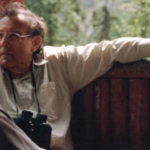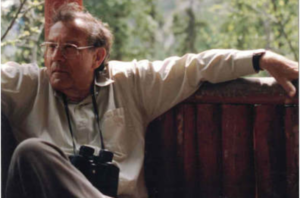In Memoriam: Kai Nielsen (1926-2021)

 The Marxist philosopher Kai Nielsen, for many years a sponsor of New Politics, passed away on March 29 in Montreal, only a few weeks away from what would have been his 95th birthday.
The Marxist philosopher Kai Nielsen, for many years a sponsor of New Politics, passed away on March 29 in Montreal, only a few weeks away from what would have been his 95th birthday.
Kai was born in Michigan and grew up in northern Illinois. Many years later he wrote that growing up during the Great Depression “marked me very deeply. It is not that I suffered personally. My parents were comfortably off. But it was what I saw around me. I went sometimes to play at the homes of my school chums, many of whom lived in ramshackle houses practically bare of furniture and barely heated. Their mothers were there with faces pinched with hunger… I concluded at a very early age that there must be something terribly wrong and even irrational in what we call the developed world for it to be like that… So socialism came early to me and remained like water to ducks.”
After school, Kai served in the Merchant Marine in the Pacific at the end of World War Two, before studying at St. Ambrose College in Iowa and the University of North Carolina. He was a graduate student at Duke University and was awarded his Ph.D. in 1959 for a thesis on moral reasoning.
In those days, Kai later reminisced, academic jobs were easy to find, and he became an assistant professor first at Hamilton College in upstate New York and shortly afterwards in the Department of Philosophy and Religion at Amherst College in Massachusetts. But Kai was a convinced atheist, which did not go down well with his department chair. So, when Sidney Hook paid a visit to Amherst and offered Kai a job at New York University, he gladly accepted.
Kai was a prolific writer. In the 1950s and 1960s he published a stream of articles on ethics, philosophy of religion (especially on the case for atheism), and the nature of philosophy itself (a topic known as meta-philosophy). These were issues that continued to fascinate him for the rest of his life, but as the sixties progressed, Kai’s attention was increasingly drawn to social and political questions, and to Marxism.
He described his politics when he went to NYU as “Deweyan social democracy. I thought that if we would hold on to our brains and be patient, we in North America, and eventually in the world, could in time end up like Sweden. The Vietnam War changed that. It was an eye-opener for me. In being part at that time of the internal resistance in the United States, I became convinced that such liberal reformist measures would never work, and slowly I became a Marxist, or, as I would now prefer to call it, a Marxian.”
By the end of the 1960s Kai was a full professor and chair of the NYU Philosophy Department, but he was also frustrated by the continuing Vietnam War and disillusioned with politics in the United States. When he was given the opportunity to move to the University of Calgary in Canada at the beginning of the 1970s, he took it.
By this time, Kai was writing on topics such as civil disobedience, the ethics of revolution, and US foreign policy. In 1975, he published “Class Conflict, Marxism, and the Good-Reasons Approach,” the first of many articles on Marxist philosophy. As Kai summarized the article, he examined “a central problem about Marxism and morality. Marx, on the one hand, exposes moralism and exhibits the ideological functions of morality and, on the other, requires objectively true moral norms for his critique of capitalism and defense of socialism. I set forth a way of looking at Marx and Marxism which shows how two apparently conflicting elements in Marxism form a coherent whole.” Fourteen years later, in his book Marxism and the Moral Point of View: Morality, Ideology, and Historical Materialism, Kai gave his longest and most detailed answers to these questions.
I met Kai when I was a philosophy graduate student at Calgary in the early 1980s. In fact, he was the first person with whom I studied Marx. On my first day in the department, I walked into his seminar on “Marx and Morality” in which, in addition to Marx, we read a collection of papers that were soon to be published in a special issue of the Canadian Journal of Philosophy, which Kai was editing. It was a wonderful introduction to Marxism and to serious philosophical discussion. Kai came prepared each week with a long commentary on the readings. After he had read that aloud, the debate would begin, with Kai inviting—and relishing the chance to respond to—disagreements.
During my time at Calgary, I grew to know Kai as a warm and generous person, who often held informal department gatherings and discussion groups at his home. Kai was also always engaged with contemporary political issues. I remember him bringing the Canadian journalist Stan Persky, who had just returned from Poland and was writing a book on the Solidarność trade union movement’s challenge to the regime, to speak on campus shortly after the Polish government had declared martial law.
Kai continued to teach at Calgary until his retirement in the 1990s, at which point he moved to Montreal. But soon he was teaching again part-time at Concordia University. Kai also remained politically active. After initially being skeptical, he became a strong supporter of Quebec sovereignty. And his commitment to socialism never wavered. A younger colleague recalls accompanying Kai to the April 2001 global justice protests in Quebec City against the Free Trade Area of the Americas:
“We were tear gassed a couple of times and I did my best to keep Kai from getting crushed by the crowds (he was in his seventies). During a parade that was part of the protest we stood on the edge of the road and Kai raised his fist in the air in solidarity as the labor union and Marxist banners went by, his eyes full of tears, memories, and hopes for a better world.”
Kai continued to write well into his nineties. By the time he died, he had published 21 books (and edited several more) and over 400 professional articles. He also left behind several unpublished book manuscripts and dozens of unpublished articles, including many on socialism, Marxism, and contemporary politics. Much of this work is collected on his website.
In his own words, Kai attempted to articulate a conception of a “meaningful and desirable life” for everyone and to show that this conception is compatible with reality. “I speak here of a conception of a flourishing world for all where there will be no poor. I want such a world. I seek again and again in various ways to clearly … articulate what this world would be like and how it could be achieved.”
Elsewhere he wrote: “Am I optimistic or pessimistic? Well, I am a fallibilist and I don’t think it is very important whether you are optimistic or pessimistic. The thing is to struggle for a better world, and to oppose the pigsty we have.”
New Politics has lost a friend and the world is a poorer place without him.